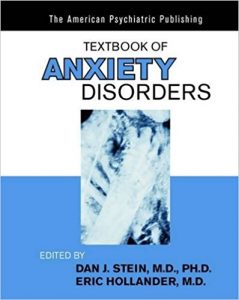Clinical Manual of Anxiety Disorders 1st Edition

Anxiety disorders are among the most prevalent, persistent, disabling, and costly psychiatric disorders, yet they are often underdiagnosed and undertreated. Fortunately, there have been major advances in understanding and treating these conditions in recent years; this is one of the most exciting areas in modern medicine.
This clinical manual has earned its place in the literature as one of just a few volumes that covers all of the major anxiety disorders and presents integrated contributions from both psychopharmacologists and psychotherapists — all in one compact work written for busy clinicians.
Though concepts of anxiety have long enjoyed a central position in philosophical and psychoanalytic theories, empirical research on anxiety disorders has a relatively short history. Here, 16 experts discuss advances in diagnosis, assessment (including relevant rating scales), pharmacotherapy, and psychotherapy.
This volume begins by reviewing recent important diagnostic, epidemiological, neurobiological, and treatment findings — all of which have significant implications for clinicians. Subsequent chapters cover – Panic disorder and agoraphobia — Laboratory studies of fear have significantly advanced our understanding of the neurocircuitry and neurochemistry of panic. Furthermore, panic disorder is now readily treated with both medications and psychotherapy.
– Specific phobia — Viewed for many years as mild and even trivial, this common disorder is now recognized for its very real associated distress and impairment. Exposure therapy is the treatment mainstay, though pharmacotherapy should be considered particularly when there is comorbidity.
– Social phobia (or social anxiety disorder) — In the past few years, the first FDA-approved medications for this disorder have been made available. Cognitive-behavioral therapy is also effective for the treatment of this underdiagnosed and undertreated condition.
– Obsessive-compulsive disorder (OCD) — OCD was the first disorder where it was shown that both specific medications and cognitive-behavioral techniques resulted in normalization of activity in particular brain structures. It is now possible to provide patients with integrated treatment approaches.
– Posttraumatic stress disorder (PTSD) — Once viewed as a normal reaction to trauma, PTSD is increasingly understood as a pathological response, characterized by specific psychobiological dysfunctions. Again, there have been exciting advances in the treatment of this disorder, with the release of the first FDA-approved agents for PTSD.
– Generalized anxiety disorder (GAD) — For a number of years GAD was thought of as a residual disorder occasionally seen in combination with more primary conditions. Nowadays, we know that GAD is an independent condition that is prevalent, persistent, and disabling.
Busy residents and psychiatrists in active clinical practice, psychologists, primary care practitioners, and other mental health professionals will find this clinical manual — with its integrated approach of both pharmacotherapy and psychotherapy — a valuable tool in their everyday practices.
DOWNLOAD THIS BOOK FREE HERE
DISCLAIMER
This website strictly complies with DMCA Digital Copyright Laws..
Please be clear that we (emedicalbooks.com) do not own copyrights of these e-books. The intention behind sharing these books and educational material is to provide easy access to medical students, doctors and other individuals related to the field of medical science, "thus only for educational purpose". We highly encourage our readers to purchase this content from the respected publishers. If anyone holding copyrights wants us to remove this content, please contact us rightaway. All books and educational material on emedicalbooks.com are free and NOT HOSTED ON OUR WEBSITE. If you feel that your copyrights have been violated, then please contact us immediately. You may send an email to emedical1521@gmail.com for all DMCA / Removal Requests. emedicalbooks.com doesn’t have any material hosted on the server of this page, only links to books that are taken from other sites on the web are published and these links are unrelated to the book server. emedicalbooks.com server doesnot store any type of book or material. No illegal copies are made or any copyright © and / or copyright is damaged or infringed since all material is free on the internet.







